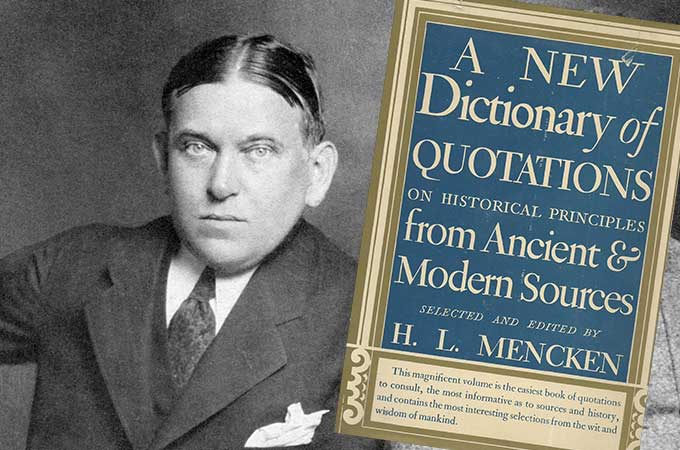New Dictionary of Quotations on Historical Principles

Thought-provoking nuggets of wisdom
The most obvious use for an anthology of quotations is as a source of a cleverly-worded phrase that summarizes an idea you are trying to convey to an audience or reader. But there’s a second use that seems to me to be far more valuable. A really good book of quotations is the result of some editor’s lifetime habit of carefully collecting the best-worded tidbits of wisdom that he or she has encountered. The best collections are therefore always published, late in life, by editors who are themselves voracious readers. In essence, they are the distillation of all the wisdom that these editors have ever encountered.
The very best anthology I’ve ever used is H.L. Mencken’s “New Dictionary of Quotations on Historical Principles, from Ancient and Modern Sources,” first published in 1942. This anthology is so useful that I own two copies — one at home, and one at work. I keep my copies in a convenient spot, and peruse them whenever I have a few idle minutes.
Mencken, who died in 1956, is nearly forgotten today. But in his own day, he was America’s leading literary critic, and was astonishingly well-read. He published the Dictionary after forty years as a writer and critic, selecting 25,000 snippets for his 1347-page book. Unlike most anthologies, this one is organized alphabetically, by keyword. Within each keyword, entries are organized chronologically, by the year in which they were written or spoken. Thus, for example, the fifty-two quotations under the heading “Youth and Age” start with ten from the ancient Greeks and Romans, followed by several from Shakespeare and his contemporaries, eight each from 18th and 19th-century authors. Nine undated proverbs from different national traditions round out the selection.
The keyword arrangement is genuinely useful, since it captures many thought-provoking ideas in capturing in one place.
Here, for example, are a few selections from the “Youth and Age” section:
– Euripides: “If we could be twice young and twice old we could correct all our mistakes”
– Shakespeare (Henry IV): “A man can not more separate age and covetousness than he can part young limbs and lechery”
– John Ray (1670 AD): “They who would be young when they are old, must be old when they are young”
– Robert Browning: “What youth deemed crystal, age finds out was dew.”
– French proverb: “Forty is the old age of youth; fifty is the youth of old age.”
The most recent reprint, from about thirty years ago, was $50 when it was new, but used copies at Amazon can be found for as little as $8. [Price for used copies on Amazon has shot up to $40 since we ran this review. If you wait a while, the price will likely drop. — MF]
It has one disadvantage: Having never been updated, it contains no material less than seventy-five years old. That’s not a problem for subjects like love or death, which were the same to the Ancients as they are to us. But for subjects of more recent vintage, like most technologies and much science, the Dictionary is of no use at all.
10/11/17(Archive.org will loan this book to you for free, in a variety of ebook formats. — editors)
A New Dictionary of Quotations on Historical Principles from Ancient and Modern Sources by H.L. Mencken 1352 pages, 1942







